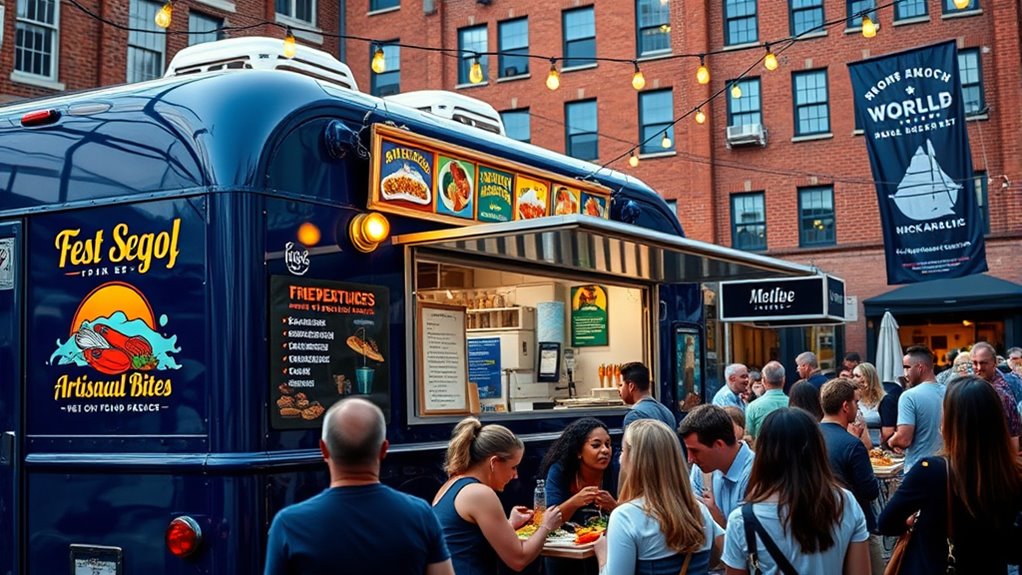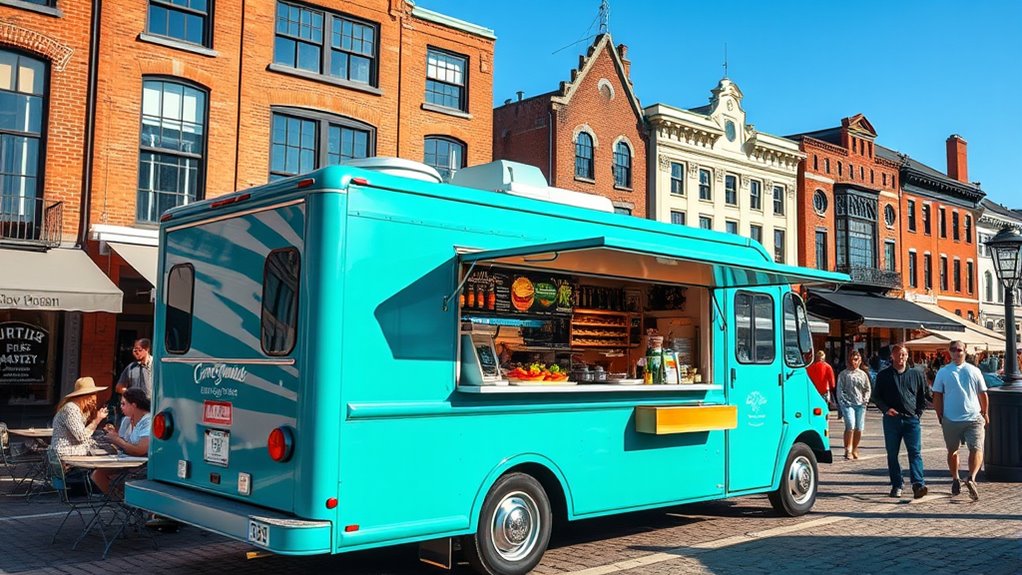To open a food truck in Portsmouth, NH, you need to secure multiple permits like a Food License, Mobile Food Service Permit, and Vendor’s License, which can cost over $1,800. Finding suitable locations involves maneuvering zoning laws and bidding at annual RFP auctions. Budget $85,000–$175,000 for startup costs, including equipment and inventory. Focus on developing a compliant menu and building your brand through community events and social media. If you want to learn how to set everything up smoothly, keep exploring these steps.
Key Takeaways
- Obtain required permits including Food License, Vendor’s License, and Mobile Food Service Permit, ensuring compliance with Portsmouth zoning laws.
- Budget for startup costs ranging from $45,000 to $200,000, covering truck purchase, permits, inventory, and marketing.
- Secure vending locations through city RFP auctions, seasonal permits, or private events, while adhering to zoning restrictions.
- Develop a flexible, compliant menu featuring regional, seasonal, and allergen-aware options suited for truck equipment.
- Promote your food truck via social media, community events, loyalty programs, and local festivals to build brand presence and customer loyalty.
Navigating Permits and Licensing Requirements

Managing permits and licensing requirements is essential for legally operating a food truck in Portsmouth, NH. You’ll need a Food License from New Hampshire’s Department of Health and Human Services, with options like Mobile Cook Unit Class D for $225 or Home Delivery Class F for $150. Portsmouth also requires a Vendor’s License, costing $250, which covers insurance and location rules. Additionally, you must obtain a Mobile Food Service Permit from the Portsmouth Health Department, costing $200, which mandates vending from a licensed commissary and certified equipment. All trucks need clear lettering of at least 4 inches, visible from 50 feet, approved by the Licensing Officer. Don’t forget, a Temporary Food Service Permit is necessary for event vending, even if you already hold other licenses. Ensuring all permits are obtained is crucial for compliance and avoiding penalties.
Understanding Costs and Financial Considerations

Starting a food truck in Portsmouth requires careful financial planning to cover both initial investments and ongoing expenses. The startup costs for a fully equipped truck can range from $85,000 to $175,000, depending on customization, with purchase or lease options costing $35,000 to $100,000. You’ll need around $2,000–$3,000 for initial inventory and about $300 for serveware and small equipment. Licensing and permits, including a vendor license and mobile food service permit, can total up to $1,864–$28,276. Monthly costs like commissary rental, waste disposal, heating, fuel, and insurance add to your expenses. Budget for marketing efforts, event participation, and unexpected costs. Overall, expect your first-year investment to be between $45,000 and $200,000, depending on your choices. Proper financial planning is essential to ensure your food truck business is sustainable and profitable in the long run. Additionally, understanding startup costs can help you better anticipate your financial needs and avoid surprises.
Locating Your Food Truck in Portsmouth

Finding the right spot for your food truck in Portsmouth means understanding where you’re allowed to operate. You’ll need to follow specific restrictions on public property and consider private options like events or private lots. Knowing these rules helps you choose locations that keep your business compliant and visible to customers. Securing proper permits and adhering to local regulations is essential to avoid fines or shutdowns. Additionally, researching local zoning laws ensures your chosen location aligns with city ordinances and reduces the risk of legal issues.
Permitted Vending Spots
Locating your food truck in Portsmouth requires understanding the designated vending spots available on public and city property. On public sidewalks in the Downtown Business District, seven spots are available for licensed hawkers and peddlers, assigned on a first-come, first-served basis without reservations. Vending carts must stay within size limits—no wider than 52 inches and no longer than 48 inches—excluding the tongue. You can have one chair, cooler, and hand truck alongside your cart. For pushcart vending, seven seasonal locations on city property allow hot dog, crepe, and ice cream carts, from April 15 to October 15, with required licensing and insurance. Restrictions include proximity to schools, hospitals, parks, and municipal parking areas, requiring adherence to specific rules and permits. Additionally, various vending spots are available in busy areas such as the Downtown Business District, which can help maximize your food truck’s visibility and sales. To ensure compliance, it’s important to stay informed about local vending regulations that may change annually or seasonally.
Restrictions and Bans
In Portsmouth, strict restrictions govern where and when food trucks can operate to protect public safety and community interests. You can’t operate within 1,000 feet of schools during peak times or hospitals for safety reasons. Food trucks must stay at least 50 feet from active public assembly buildings and avoid parking in front of landmarks like North Church. Additionally, vending is banned in residential districts to prevent neighborhood disruption. Portsmouth limits street operation to a single designated downtown spot, auctioned annually. Sidewalk vending is limited to specific spaces, and permits or bids are required for parking in public areas. These rules balance community safety with local business needs. It is important to understand local regulations to ensure compliance and successful operation.
Developing a Compliant and Appealing Menu

When developing your menu, you need to make certain it meets Portsmouth’s health department standards and can be approved during inspections. Focus on seasonal and event-specific offerings to attract customers and stay compliant with local permits. Finally, differentiate your food truck with unique, appealing choices that stand out in Portsmouth’s competitive market.
Menu Compliance Standards
Creating a compliant and appealing menu for your food truck in Portsmouth requires careful attention to food safety regulations and customer expectations. You must guarantee your menu aligns with health department standards, including proper ingredient sourcing, storage, and labeling. Using licensed, certified equipment is essential—no homemade modifications allowed. Your menu should feature items that fit within your truck’s space and equipment capabilities, avoiding complex preparations. Additionally, your menu must clearly display allergen information and meet local signage requirements. Proper refrigeration and stock management are critical for safety and freshness. Furthermore, understanding menu variety can help attract a broader customer base and increase sales. Finally, guarantee your menu items are consistent with the approved offerings on your permit, and be prepared for potential re-approvals if you make changes. This diligent approach helps keep your operation compliant and trustworthy.
Seasonal & Event Offerings
Leveraging seasonal events provides a valuable opportunity to showcase your food truck’s creativity while staying compliant with health regulations. During festivals like the Great Bay Food Truck Festival in May, you can introduce limited-time spring menus that highlight local, fresh ingredients. Align your offerings with seasonal produce to reduce costs and emphasize freshness. Consider themed specials, such as hearty comfort foods in autumn or chilled gourmet items in summer, to attract event attendees. Collaborate with local event themes or partners, like beer gardens, to craft appealing menu items. Use feedback from these events to refine your menu or develop rotating seasonal options. Keep your menu flexible to adapt to permit restrictions and ingredient availability, ensuring compliance and maximizing seasonal appeal. According to event organizers, hosting seasonal menus can also boost your visibility and attract repeat customers looking for fresh, innovative options. Embracing menu flexibility allows you to respond quickly to changing regulations or ingredient availability, maintaining compliance while offering exciting choices.
Differentiating Food Selections
Developing a menu that stands out in Portsmouth’s competitive food scene requires careful attention to both compliance and originality. Focus on offering unique regional or ethnic specialties not commonly available locally to attract niche markets. Create signature dishes that become strongly associated with your brand, helping you stand out in limited vending spaces. Offer creative twists on familiar comfort foods to appeal broadly while maintaining freshness. Incorporate locally sourced ingredients reflecting New Hampshire’s seasonal produce to boost authenticity and community ties. Also, include dietary options like gluten-free, vegan, or keto choices to cater to diverse preferences. Local regulations often influence menu offerings, requiring adherence to health codes and ingredient disclosures. Understanding menu compliance is essential to avoid legal issues and ensure customer trust. Highlight signature dishes and regional specialties. Use local, seasonal ingredients for authenticity. Offer a variety of dietary restrictions. Develop visually appealing, branded menu items.
Building Your Brand Through Marketing Strategies

Building a strong brand for your food truck relies on strategic marketing efforts that resonate with your target audience. Social media is a powerful tool; 68% of food truck owners use it regularly, with Facebook being the most popular—used by 75%. Effective social campaigns can boost sales by 20%, and mobile apps help customers locate trucks, increasing downloads by 35%. Participating in local festivals and community events—at least three annually—raises visibility and builds loyalty through repeated presence. Over half of food trucks implement loyalty programs, increasing repeat visits by 30%. Engaging Millennials and Gen Z by aligning branding, menu options, and visuals guarantees relevance. Using data analytics and GPS tracking enhances targeting, engagement, and operational efficiency, helping you establish a memorable, trusted brand in Portsmouth. Market growth and digital tools are driving the industry forward, making strategic online presence more critical than ever.
Overcoming Challenges and Regulatory Barriers

Charting Portsmouth’s regulatory landscape poses significant hurdles for food truck operators. You’ll need to navigate strict zoning rules that limit vending to designated public parking or specific private zones, avoiding residential districts and large commercial areas. Securing parking involves participating in annual RFP auctions with high starting bids—often $5,000 or more per season. Additional hurdles include obtaining state and local permits, which require multiple inspections and compliance with health regulations, as well as possible special exceptions from zoning boards. Overcoming these barriers involves strategic planning, such as zoning restrictions targeting limited downtown parking spots. Building relationships with city officials and community stakeholders. Exploring alternative locations outside restricted zones. Preparing for costly licensing and permit processes. Persistence and adaptability are key to establishing your food truck amidst these challenges.
Frequently Asked Questions
Can I Operate a Food Truck on Private Residential Property in Portsmouth?
You can’t operate a food truck on private residential property in Portsmouth without special permission. The zoning laws mainly focus on commercial areas, and residential zones typically restrict vending. You’ll need to consult the Portsmouth Planning Department to see if you can get an exception or special permit. Even then, you’ll face strict health, safety, and insurance requirements, making residential operation challenging without proper approval.
Are There Specific Health or Safety Training Requirements for Staff?
Did you know that over 48 million people suffer from foodborne illnesses annually? In Portsmouth, your staff must complete a 2-hour food safety course and pass an exam to prove their knowledge. As the food truck owner, you need a Certified Food Manager with an 8-hour certification. All staff involved in food handling must stay trained, ensuring compliance with local health laws and keeping your customers safe.
How Do Seasonal or Special Event Permits Differ From Year-Round Licenses?
You’ll notice that seasonal and special event permits differ from year-round licenses mainly in duration and location restrictions. Seasonal permits are limited to specific months or seasons, and special event permits are temporary, valid only during events. Year-round licenses offer continuous operation, broader location flexibility, and require compliance with all health and safety standards. Costs tend to be higher for annual licenses, while seasonal and event permits are more cost-effective but have stricter operational limits.
What Are the Best Strategies to Find Private Property for Food Truck Operations?
To find private property for your food truck, start by building relationships with local business owners and property managers in permitted zones. Offer mutually beneficial agreements like revenue sharing or rentals, emphasizing increased foot traffic. Research zoning laws and obtain necessary permits early. Look for high-visibility sites near busy pedestrian areas or complementary businesses. Make certain the location has utilities and complies with city regulations, and stay flexible by leveraging events or temporary permits when needed.
How Can I Stay Updated on Changing Local Food Truck Regulations?
Imagine you’re sailing in uncharted waters; staying updated on local food truck rules is your navigation system. Regularly check Portsmouth’s official website and sign up for email alerts from the Health Department. Join local industry groups and attend community events to hear firsthand about regulatory changes. Set Google Alerts for key keywords and follow state legislative updates. These tools help you stay informed and avoid unexpected storms on your business journey.
Conclusion
Starting your food truck journey in Portsmouth is like steering a well-mapped vessel—clear permits, a tasty menu, and smart marketing keep you on course. Remember when a fellow vendor faced hurdles but adapted with creative branding and local partnerships? That’s how you’ll turn challenges into opportunities. Stay flexible, stay focused, and soon you’ll be guiding the city’s streets with a thriving, beloved food truck. Your success is just around the corner—drive forward!









